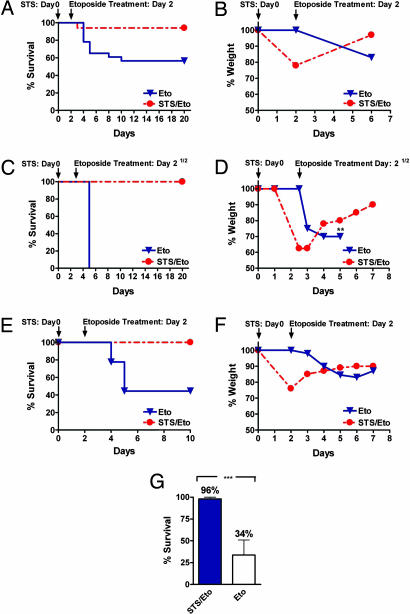Fig. 4.
Short-term starvation protects against high-dose chemotherapy in vivo. (A) A/J mice were treated (i.v.) with 80 mg/kg etoposide with (STS/Eto, n = 17) or without (Eto, n = 23) a prior 48-h starvation (STS). (B) Percent weight loss (a measure of toxicity) after etoposide treatment in STS-treated (n = 17) or untreated (n = 23) A/J mice. (C) CD-1 mice were treated (i.v.) with 110 mg/kg etoposide with (STS/Eto, n = 5) or without (Eto, n = 5) a 60-h prior starvation. (D) Percent weight loss after etoposide treatment in STS-treated (n = 5) or untreated (n = 5) CD-1 mice. Asterisks indicate the day at which all mice died of toxicity. (E) Athymic (Nude-nu) mice were treated (i.v.) with 100 mg/kg etoposide with (STS/Eto, n = 6) or without (Eto, n = 9) a 48-h prior starvation. (F) Percent weight loss after etoposide treatment in the treated (STS/Eto, n = 6) or untreated (Eto, n = 9) athymic (Nude-nu) mice. (G) Comparison of survival of all of the mice that were either prestarved (STS/Eto) or not (Eto) before etoposide injection. The survival of all STS-treated (n = 28) and untreated (n = 37) mice from all genetic backgrounds above (A/J, CD1, and Nude-nu) has been averaged (***, P < 0.05).

